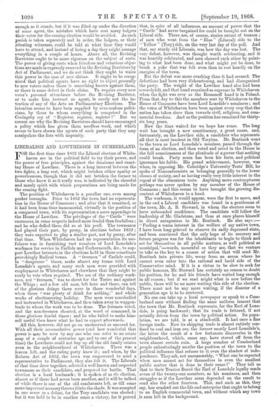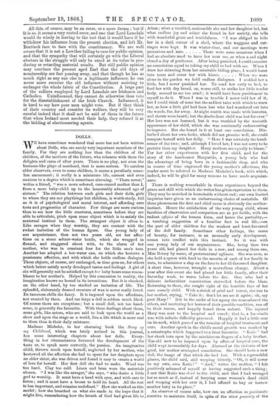LIBERALISM AND LOWTHERISAI IN CITMBERLAND.
FOR the first time since 1832 the Liberal electors of White- haven are in the political field to try their power, and the power of free principles, against the dominant and exact- ing House of Lowther. There is a long interval between the two fights, a long rest, which might betoken either apathy or powerlessness, though that it did not betoken the former to those who knew it as it really was, is indicated by the cheerful and manly spirit with which preparations are being made for -the coming fight.
The position of Whitehaven is a peculiar one, even among .pocket boroughs. Prior to 1832 the town had no representa- tion in the House of Commons ; and after that it remained, as it had been from time immemorial, virtually in the position of a conquered town, with its representation a mere appendage to the House of Lowther. The privileges of the " Castle " were enormous, in some respects indeed more feudal than feudalism ; -and he who defied them did so at his peril. The townsmen had played their part, by proxy, in elections before 1832 ; they were expected to play a similar part, not by proxy, after that time. When Whitehaven had no representation its use- fulness was in furnishing vast numbers of Lord Lonsdale's workmen for service in Carlisle and Cockermouth, &c., to sup- port Lowther interests in the elections held in those sometimes provokingly Radical towns. A " freeman " of Carlisle could, in " dangerous " times, make almost any terms with Lord Lonsdale's agents, and many such men were provided with employment in Whitehaven and elsewhere that they might be ready to vote when required. The use of the ordinary work- men, not "freemen," was to shout for the Tories and against the Whigs ; and a few old men, left here and there, can tell of the glorious doings there were in those wonderful days, when there "was plenty of drink for nothing," and whole 'weeks of electioneering holiday. The men were marshalled and instructed in Whitehaven, and then taken away in waggon- loads to where the work was to be done. The freemen voted, .and the non-freemen shouted, at the word of command, in those glorious feudal times ; and he who failed to make him- self useful then knew what he had to expect afterwards.
All this, however, did not go on unobserved or uncared for. With all their accumulative power (and how wonderful that power is iamy be seen by any one who can refer to an estate map of a couple of centuries ago and to one of the present time) the Lowthers could not buy up all the old family estates even in the neighbourhood of Whitehaven. There was a leaven left, and the ruling party knew it ; and when, by the Reform Act of 1832, the town was empowered to send a representative to Parliament, they also felt it. The Liberals of that time drew together, selected a well known and respected townsman as their candidate, and prepared for battle. That election is a local landmark ; it is spoken of as the election, almost as if there had never been another, and it will be talked of while there is one of the old combatants left, or till some more important memory throws itinto the shade. It was accepted in one sense as a defeat, for the Tory candidate was elected ; , but it was held to be in another sense a victory, for it proved
that, in spite of all influences, an amount of power that the "Castle "had never bargained for could be brought out on the Liberal side. There are, of course, stories extant of treason ; of men who went from the " Blae " (Liberal) side to the " Yellow " (Tory) side, on the very last day of the poll. And that, say sturdy old Liberals, was how the day was lost. The very defeat, however, was thought worth celebrating, and it was heartily celebrated, and men cheered each other by point- ing to what had been done, and what might yet be done, to break a yoke that was felt even then to rest heavily on the energies of the town.
But the defeat was more crushing than it had seemed. The defections had been very disheartening, and had disorganized the party. The weight of the Lowther hand also had been severelyfelt, and that hand remained as supreme in Whitehaven when the fight was over as the Romanoff hand is in Poland. From that day to this the members sent by Whitehaven to the House of Commons have been Lord Lonsdale's nominees ; and the votes of Whitehaven have been against every step that the nation has taken since then towards civil, religious, and com- mercial freedom. And so the position has remained for thirty- six long years.
Now the time waited for we hope has come. The long wait has brought a new constituency, a great cause, and, fortunately, on the Lowther side, a candidate who represents all that is most insolent in Old Toryism. Mr. Bentinck went to the town as Lord Lonsdale's nominee, passed through the form of an election, and then voted and acted in the House in the full consciousness of the plenitude of a power that nothing could break. Party scorn has been his forte, and political ignorance his foible. His grand achievement, however, was when, in opposing Mr. Coleridge's University Tests' Bill, he spoke of Nonconformists as belonging generally to the lower classes of society, and as having really very little interest in the repeal of the obnoxious tests. Anything more contemptuous perhaps was never spoken by any member of the House of Commons ; and this seems to have brought the growing dis- content of Whitehaven to a bead.
The workmen, it would appear, were the first to move, and in the end a Liberal candidate was found in a gentleman of the town, Mr. A. B. Steward, in whom the electors seem to have unbounded confidence. The candidate will follow the leadership of Mr. Gladstone, and thus at once places himself in direct antagonism to Mr. Bentinck. He also says :— "Feeling a warm interest in the welfare of my native town, I have been long grieved to observe its sadly depressed state, and been convinced that the only hope of its recovery and future progress was for the inhabitants to begin to think and act for themselves in all public matters, as well political as municipal,"—words, mournful as they are, that we venture to take as the key to a course of action that will send Mr. Bentinck into private life, -away from an arena where he cannot even enter into the rational and lucid side of the Conservative mind. If it is a virtue to be slow to seek for public honours, Mr. Steward has certainly no reason to doubt his position, for he and his friends have waited long enough in all reason ; but if we read aright what is now before the public, there will be no more waiting this side of the election. There must not be any more waiting, if the disaster of a generation ago is to be retrieved.
No one can take up a local newspaper or speak to a Cum- berland man without finding the same uniform lament that the town that Mr. Bentinck represents, for the Earl of Lone- dale, is going backward ; that its trade is fettered, if not actually driven from the town by political action. Its popu- lation, we are told, is at a stand-still. It had once a fine foreign trade. Now its shipping trade is almost entirely con- fined to coal and iron ore, the former mostly Lord Lonsdale's, the latter the result of a few fortunate discoveries in the neighbourhood, which, some say, have staved off from the town almost certain ruin. A large number of Cumberland people unhesitatingly ascribe the position of the town to the political influence that refuses to it even the shadow of inde- pendence. They ask, not unreasonably, "What can be expected when men cannot act for themselves in even the smallest public matter that is done in their name ?" They tell us that to their Trustee Board the Earl of Lonsdale legally sends seven of the twenty-one members, as his nominees, and then struggles as if the Lowther acres depended on the result to send also the other fourteen. This, and such as this, they say, has crushed out the life and enterprise that ought to belong to an English commercial town, and without which any town is soon left in the background.
All this, of course, may be an error, or a mere dream ; but if it is so, it seems a very rooted error, and one that Lord Lonsdale would do wisely in leaving to the test that it would have if he withdrew his influence from the present election, and left Mr. Bentinck face to face with the constituency. We are well aware that it is not a Lowther failing to care for public opinion, and that the sympathy that will certainly go with the Liberal .electors in the struggle will only be rated at its value in pro- .ducing or retarding material results. But still public opinion may convince the present aged Earl that the old days of momineeship are fast passing away, and that though he has as -much right as any one else to a legitimate influence, he can never more exercise the old influence without assisting to -endanger the whole fabric of the Constitution. A large part -of the colliers employed by Lord Lonsdale are Irishmen and -Catholics. Uninfluenced, they cannot do otherwise than vote _for the disestablishment of the Irish Church. Influenced, it is hard to say how poor men might vote. But if they think -of their country and consider its welfare, they will be very .eareful indeed that it shall not be said of them in the future -that when Ireland most needed their help, they refused it at the bidding of electioneering agents.































 Previous page
Previous page